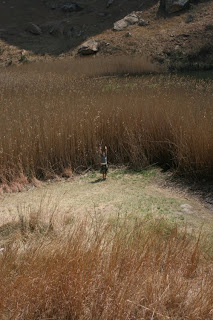Last night it didn’t take much. After a long, trying week that tested some of the important community relationships I’ve been working to build, I just wanted to go out for a sweet gin and tonic with a couple of friends to celebrate the week’s end.
In Viljoenskroon, the bar options are limited. And the choice of where-to-go is entirely based on “who” I go with. For instance, a black person would never feel comfortable in a white bar – even if they went with friends. Lucky for me, white people are almost lauded when they attend the black bars, well, because it’s so rare. To be frank, there are 3 white bars “in town” and 1 black bar. “Town” means Viljoenskroon or the white part. In Rammolutsi “the township” aka “the location” aka the black part, there are myriads of taverns to choose from. A tavern is a place to buy a beer with chairs and tables and a bar is a place with a bar and a variety of liquor. So, Friday night being the night I went out with siblings Andrew and Bronwyn, we ended up at one of the limited white bars in town.
So Pikie’s Pub it was. The long and short of it, I was introduced to a farming peer of Andrew’s. In other words, a Boer. Boer being an Afrikaans farmer as they’re commonly referred to here. I think in some instances it is used as a derogatory term, but it depends on who’s saying it. After our brief introduction, the slew of typical questioning ensued, or so I thought. “How do you find Africa?” Usually after that question comes “How is America?” But that didn’t happen.
“You want to go back home.” Statement.
“No, I’ve lived here two years.”
“Yeah, well Africa, most of it’s working, there are just those 1/3 of people who don’t want it to work.”
“Well I wouldn’t have stayed if I didn’t appreciate the place.”
“You Americans, what are you doing with all your wars. Going into other countries and killing innocent peoples. Like Vietnam. You fucked up.” Statement.
“Well, I’m not supporting the wars, but what’s so different about going to another country to kill people and killing people in your own country?”
At this point the bloke was absolutely, 100% totally disinterested in what I had to say. He wanted to talk “to” me, not “with” me. And he proceeded to get 5 inches from my face, spitting on my skin, blowing his hot alcoholic breath beneath my nostrils, and went on a tirade, a verbal assault on my Americanism. He didn’t once ask my politics. He just assumed. And he assumed that I thought he’s a racist (well, after the night, I would guess he probably is), but “who are you to come to this country and help these people? These blacks, they murdered 2 whites on the farm on Wednesday. And they assaulted two small white children yesterday. And you think we [Afrikaaners] are racist?”
The man wouldn’t stop. And he was huge. I told him to stop talking to me. I told him he was talking kak. He wouldn’t listen. He went to the other side of the bar and yelled “Go back home to your fucking America. We don’t want you here.”
Wow. Like I said, 27 months in this country. I had been warned about the belligerent nature of many Afrikaans men in bars – including my English-speaking white friends who’ve been beaten-up in bars just for being English-speaking. However, I have never before given any of that real credence since I hadn’t witnessed it personally. I generally like giving the benefit-of-the-doubt. Yet, here I am in the Alabama or Arkansas or Texas of South Africa and I finally have had a real taste of how deep the divisions lie. I knew some (not all) people are totally disinterested to see my participation in the black community. But I have never been attacked for caring, though that’s not to say people haven’t thought that before.
It felt really raw leaving that bar. The guy calmed down. Everyone apologized for him. But not he for himself. His meek wife even apologized – I thought to myself, “it’s you I feel sorry for.” I thought, “why am I bothering to learn this language of Afrikaans?” I thought, “what the hell am I doing in this place?” I thought, “I will never be one of any of the communities here.” It’s a harsh reality, but it’s so true.
While I argue against some of the white people who take issue with me dropping in from the outside, there are also black people who would probably prefer my visit was up already. I don’t believe in a lot of the politics put forth by the ANC because it exacerbates racial divisions. I don’t fit in. Point blank.
But I am lucky to have a found a small holding of open, loving people in this community, white and black. And in those circles I do fit in. By now, those of you reading this may be thinking, “Shannon, darling, go home!” or “Shannon, you sound so unhappy! This is not the place for you.” But, by the grace of some God, I am here because there is work to do and I get to be part of the small forward movements in the lives of many children. And I cannot tell you how happy that makes me. If only the area was filled with the magic openness of 10 years-olds! If only people become more in-touch with the child in their heart of hearts, that part that enables them to love.
In the meantime, I have an enemy. There’s no time like now to become more challenged by practices of tolerance. How will I ever understand the struggle for blacks to love whites and vice versa if I myself have not had to learn to tolerate blatant attacks of racism and ill-will?



































